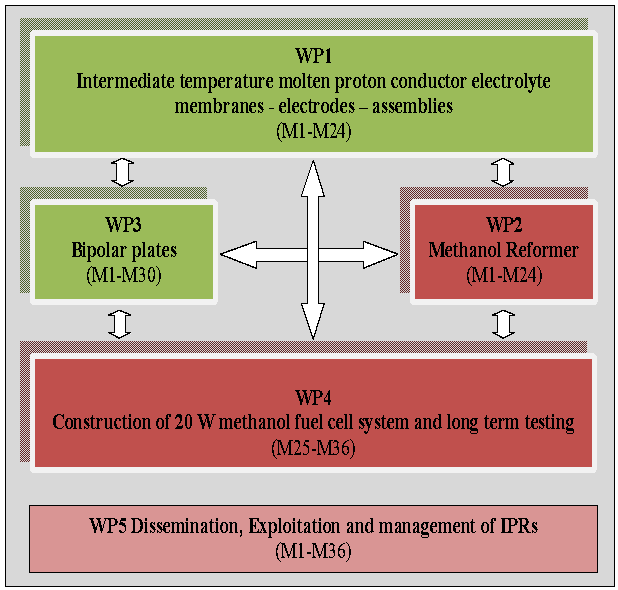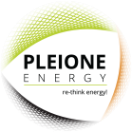DESCRIPTION
The MethCell project is organized in four (4) technical work packages (WP1-WP4), one (1) work package devoted in management & dissemination (WP5), nine (9) deliverables and five (5) milestones, which focus on the following research directions:
- Intermediate temperature molten proton conductor electrolyte membranes
- Methanol reformer
- Bipolar plates

Research approach and methodology
Membranes (WP1). A main prerequisite for the operation of reformed methanol fuel cell is functional electrolytes at 200-250oC, with exceptional stability under cycling conditions in combination with high proton conductivity values (> 10-2 S/cm). Previous work done by the research team from SJTU opens new horizons for this type of fuel cells, since higher temperatures can be employed with a new generation of intermediate temperature molten proton conductor electrolyte electrolytes, thus fully matching the operation temperature of the incorporated methanol reforming catalyst, as this was successfully developed in previous FCH JU projects, coordinated by Prof. Avgouropoulos in Patras. In order to elucidate the interfacial proton conducting mechanism of the electrolyte, detailed mapping will be conducted based on the combination of interface micro-structure analysis, the NMR analysis of proton diffusion coefficient and the EIS analysis.

Methanol reformer (WP2). In view of the fuel cell operation level at 200-250oC, significant improvements of methanol reforming catalysts are required with regards to their mass activity in order to be functional. Therefore, we will focus on two directions:
- optimization of CuZn-based catalysts. Significant enhancement of copper oxide reducibility -especially under methanol/water feeds- is necessary at the cell operation level of 200-250oC. This will be done by promoting the key properties of Cu with other metals (e.g. Ce, Mn, Fe, Al). Tuning the catalytic properties can be also achieved via optimizing the synthesis parameters of a hydrothermal method resulting in the desired nanostructure (shape effect).
- atomically dispersed catalysts mainly referring to Au on hydrothermally prepared CuZn nanostructures, targeting the control of the electronic properties and dispersion of the catalytically active surface atoms. The study of the various reforming catalysts will be aided by detailed spectroscopic characterization comprising XPS to study the chemical structure, TEM to study the crystallinity and determine the particle size of the nanoparticles.

Bipolar plates (WP3). Al- and C-based bipolar plates suitable for operation under the corrosive conditions of an intermediate temperature fuel cell will be developed via a low cost and easily scaled up manufacturing process, so as to be competitive for portable applications. Al provides excellent properties for machining and excellent mass production and lightweight construction possibilities. PLEIONE in close collaboration with UPAT will design the flow fields of the bipolar plates and employ conventional CNC-machining for the manufacturing targeted prototype plates PLEIONE will also perform simulation studies to study the heat transfer in the bipolar plates aiming to the optimization of the thickness, design and dimensions of the plates. Gold electroplating will be applied as reference anticorrosion coating, however due to cost requirements alternative coatings will be also studied. An alternative solution based on carbon fiber composites will also be investigated by PLEIONE.

Fuel cell stack (WP4). Based on the optimized materials of previous WPs, the design and construction of an improved fuel cell stack (up to 5 MEAs) system will be developed. Through the structure design of bipolar plates, we can integrate the fuel cell with methanol reformer. It will work at the same temperature platform, thus decreasing the thermal loss, and reducing the overall size and weight of system. The operating targets of the new fuel cell system is to operate at temperatures ranging between 200-250oC at a current density higher than 50 mA/cm2, while having the flexibility to provide power within the range of 10-20W.







